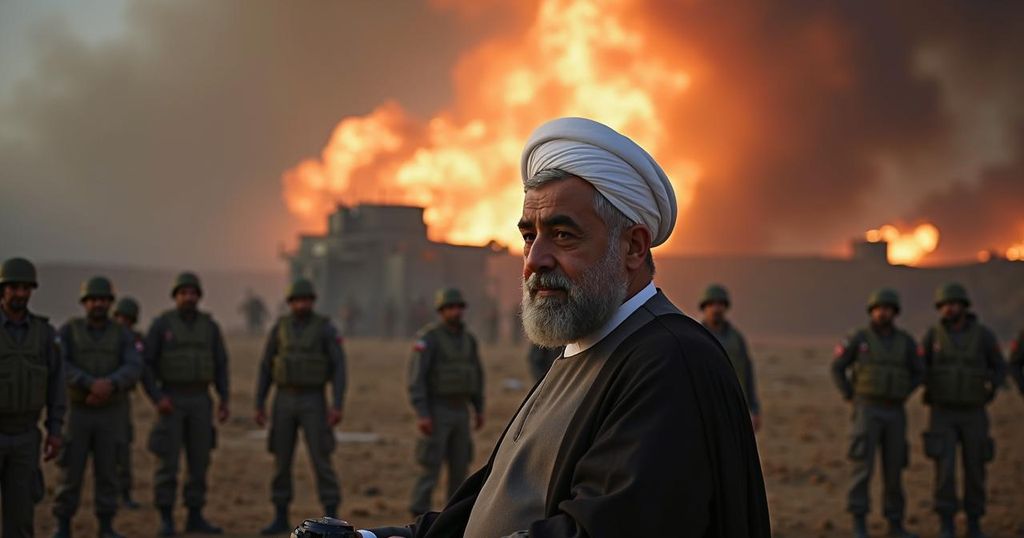Iran is reportedly nervous as it anticipates Israel’s response to recent missile attacks, with diplomatic efforts being made to mitigate potential retaliation. The U.S. is urging a proportional response while addressing concerns about regional stability. Israel’s Defense Minister has warned of a significant potential response, and regional allies have expressed their intentions to remain neutral in the conflict. The ongoing tensions present a complex web of military, political, and diplomatic challenges in the region.
The Iranian government finds itself in a state of heightened anxiety as it anticipates Israel’s reaction to recent missile attacks it launched earlier this month. Urgent diplomatic engagements are underway among Iranian officials with Middle Eastern nations to explore options to mitigate the extent of Israel’s retaliation, and potentially shield Tehran should diplomatic efforts fall short. Sources familiar with the situation disclose that the uncertainty surrounding U.S. assurances to dissuade Israel from attacking Iranian nuclear facilities or oil sites significantly exacerbates Iran’s concerns. Compounding this, the U.S. views Hezbollah, Iran’s principal proxy in the region, as having suffered detrimental losses due to Israeli military actions in recent weeks. The U.S. has been in close consultation with Israel regarding its response to Iran’s attack, emphasizing that any retaliation should be measured and proportional. U.S. President Joe Biden’s recent conversation with Israeli Prime Minister Benjamin Netanyahu marked their first direct communication in nearly two months, amidst shared apprehensions voiced by Gulf allies about potential strikes on Iranian oil infrastructure impacting regional stability and economies. Both nations are embroiled in a tit-for-tat conflict that began following an Israeli strike perceived as targeting an Iranian consulate in Damascus earlier this year. The Biden administration is acutely aware of the potential for these escalatory actions to erupt into a broader regional conflict, which may also implicate U.S. interests. Israel remains resolute in its military planning and capabilities, as evidenced by the statements from Defense Minister Yoav Gallant, who assured a “powerful, precise, and above all – surprising” response to Iranian provocations. Notably, Israel has conducted significant military operations without U.S. consultation, including actions against Hezbollah and high-profile assassinations. Regional allies, particularly in the Gulf, are expressing their desire to remain neutral in this escalating tension. They have clearly communicated to both Washington and Tehran that they shall not permit Israeli incursions into their airspace should a military strike against Iran occur. Nonetheless, Iran’s Foreign Minister, Abbas Araghchi, has suggested that the actual pursuit of war is primarily driven by Israeli leadership. The ongoing situation remains precarious, as differing factions within Iran are likely to respond variably depending on the scale of Israeli actions. A series of meetings between Iranian officials and Saudi representatives aim to navigate this crisis and explore collaborative responses. Meanwhile, Israel will suspend major military maneuvers in observance of Yom Kippur until the end of the Sabbath.
This article examines the escalating tensions between Iran and Israel significantly influenced by recent Iranian missile attacks against Israel. The potential Israeli response to these provocations is of grave concern to Iran, which finds its military and political proxies, particularly Hezbollah, in a weakened position. The U.S. has been playing a mediating role, advising restraint and caution as both nations navigate their responses amidst fears of a wider conflict. The dynamics of U.S.-Israeli relations, regional diplomacy, and the implications of these military actions highlight the delicate balance of power in the Middle East.
In conclusion, the situation remains highly volatile as both Iran and Israel navigate heightened tensions following Iran’s missile strikes. While Iran seeks urgent diplomatic solutions to mitigate retaliation, the U.S. is involved in urging caution from Israel, stressing the importance of proportional responses to avoid further escalation. As the region’s dynamics evolve, the potential for conflict remains a pressing concern for all parties involved, particularly with the backdrop of critical religious observances affecting immediate military actions.
Original Source: www.cnn.com






